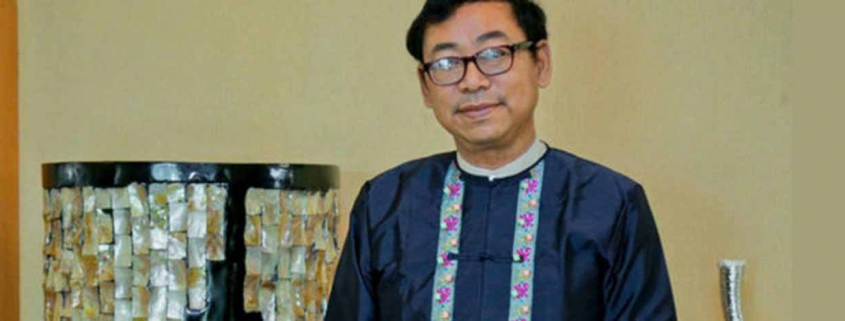Lifelong Human Rights Defender Continues to Inspire
By NYEIN NYEIN 29 May 2019
Called a “sacred human resource” by colleagues, U Aung Myo Min is a workaholic. Despite a serious ailment, the Equality Myanmar executive director dedicates all of his time working to advocate and raise awareness for issues of human rights.
U Aung Myo Min is a pioneer of human rights education in Myanmar, with more than three decades of work in the field. The Yangon-based activist and educator works closely with women, youth, refugees, migrant workers and LGBT groups, as well as with legislators and government officials.
Now 53, he’s been a devoted “lifelong activist for human rights” since 1988, when he participated as a student activist in Yangon in the nationwide campaign calling for democracy and human rights in Myanmar that year. At the time, he was in his final year at University of Yangon where he was studying for a degree in English. It was March 16, 1988, he said, that changed him: the day the White Bridge ran red with the blood of student protesters. What he saw enraged him. Marching at the forefront of student demonstrations spilling out from the university campus, he and others were blocked by soldiers behind iron barricades at the bridge, then beaten by police, who had started hitting everyone. People were left lying on the road or forced into police vans.
After August 1988, U Aung Myo Min led fellow activists at student demonstrations in Mudon, Mon State. He would address crowds every day until finally leaving for the jungle, along the Thailand-Myanmar border in Karen State, where he joined the armed student revolutionary group the All Burma Students’ Democratic Front (ABSDF). The camp he stayed in was known as the Mudon Battalion, or ABSDF Battalion 204. Later, he went on to study human rights at Columbia University in New York.
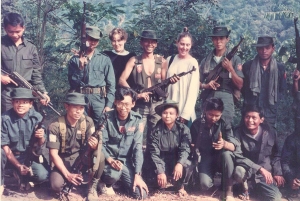
Upon completing his studies, in 1993 he returned to work near the border.
Like many other students who witnessed “so many acts of injustice by the [then]government—particularly the brutal crackdown on peaceful demonstrators,” he said, he decided “to stand for the truth and the rights of the people.”
His “desire for truth and justice” was his motivation for getting involved in human rights, he said in a 2018 interview with FORUM-ASIA, of which Equality Myanmar is a member.
In the interview he recalled that his motivation was reinforced along the Thailand-Myanmar border, where he said he witnessed many ethnic people suffering at the hands of the Tatmadaw, the armed forces of Myanmar.
“Their stories of human rights violations motivated me to defend their rights,” he said.
Reflecting on that today, he says there is still a long way to go to achieve truth and justice for those victims, both in Bamar-majority areas and in ethnic minority areas.
“We still face many challenges to seek truth for those who experienced human rights abuses, especially when they are related to the military. There are many hurdles, deterrents and difficulties to seeking truth…and justice,” he told The Irrawaddy.
As seeking justice became more difficult, people sometimes lost trust in the idea of universal human rights, he said, allowing themselves “to solve injustice through unfair means.”
“This led to violence and aggression,” he said. “We need to be very careful to tackle this issue.”
Passionate educator
U Aung Myo Min has educated many people, young and old alike, interested in promoting human rights in Myanmar, and he has documented the human rights situation here since the 1990s.
His dedication to giving a voice to the voiceless and to disseminating human rights knowledge has earned him wide respect.
“We are inspired by his work,” said Daw Tin Tin Nyo of the Burmese Women’s Union, who got to know U Aung Myo Min more than 22 years ago. He has been her idol, instructing her on human rights and human rights data collection since he first taught her in a refugee camp at the border.
When many students from the border area camps left to study abroad in the 1990s, U Aung Myo Min was the only person to return and continue working at the border, said U Kyaw Ko, a fellow Mudon demonstrator who stayed in the same camp as U Aung Myo Min with the ABSDF.
U Kyaw Ko, sharing some of his last words with The Irrawaddy just before his unexpected death in mid-May, added that, “as a champion of the LGBT community,” U Aung Myo Min “is open-minded, friendly and possesses a strong morale.”
U Aung Myo Min was the first gay activist to openly come out and fight against homophobia and LGBT-based discrimination in Myanmar.
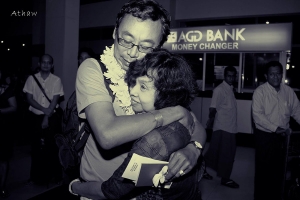
Exiled for 23 years, U Aung Myo Min returned to the country in 2012 to work on human rights education across Myanmar society. In exile he advocated for human rights with the National Coalition Government of the Union of Burma (NCGUB) and the Human Rights Education Institute of Burma (HREIB), the latter of which he founded and, after returning to Myanmar, continued under the name Equality Myanmar.
He was recognized with the 2017 Schuman Award alongside two other rights advocates by the European Union. He was also recognized with seven other awards, including the Celebration of Courage: the Felipa de Souza Award, given by the International Gay and Lesbian Human Rights Commission in 1999.
“Promotion of human rights is not only about condemning violence but also creating pacifists instead of aggressors. Those who respect human rights should regard any violence as an assault on mankind—not only when it is targeted at them,” he wrote in 2017.
“Human rights do not discriminate. It is a humane notion that rejects any and all violence,” he said.
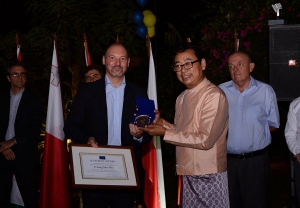
In 1998, in his early 20s, U Aung Myo Min still wanted truth and revenge, and that motivated him in his activism. But he left his feelings of revenge behind to seek justice, and changed from a hard-working activist to an academic and a smart-working activist.
“There is no regretting or deluding the beliefs I’ve held, but as the movement went on for longer, it changed us in some ways. “It hurts sometimes, for some people, to put so much of ourselves into the work of change, and for it to still require more than we are capable of.”
Despite his enthusiasm for activism, U Aung Myo Min recently began facing some severe health problems, and is currently being treated for kidney failure. He says he is glad there are younger generations walking in his shoes now. He has felt depressed about not being able to physically do what he’s wanted to do but, because of his facility as an educator, many new generations will continue the movement.
Asked his biggest desire outside of politics at this moment, U Aung Myo Min said: “Personally, I want to be in good health.”
“I am satisfied and relieved,” he said, reflecting on the state of human rights education and the work of his organization, which has not stopped even though he has been in the hospital for more than a month.
“They move on and they take their responsibility. It is a lesson for all of us. We need to empower others to win the long battle,” U Aung Myo Min said.
Icon of LGBT movement
While much of Myanmar society considered it a taboo subject, U Aung Myo Min is open about his sexuality.
He “speaks and acts for the human rights of all, as well as to the neglected groups in society,” said Daw May Sabe Phyu, director of the Gender Equality Network, in which U Aung Myo Min is a steering committee member.
“I’ve personally known him since 2012. I would say he is an extraordinary person for the country. His advocacy skills are very strong and effective,” she said. “He is a sacred human resource for all of us.”
She said she cherished his ability to convince everyone, including policymakers and legislators, when speaking openly about his beliefs.
“He never hesitates to criticize any wrongdoing; his criticisms are based on the facts and not personal attacks,” she said.
Positive changes in attitudes toward the LGBT community in Myanmar are largely due to his advocacy and anti-discrimination efforts, Daw May Sabe Phyu said. Many in Myanmar only see LGBT individuals portrayed humorously in the media, as part of a joke or a character, and think they are incapable of serious political engagement. “But he is different,” she said. “His expertise is exceptional, and he uses it to change people’s perspectives.”
As part of its awareness raising, Equality Myanmar conducts community-based activities and social events, such as hosting the International Day Against Homophobia (IDAHO) every May 17. They educate the wider, non-LGBT community about understanding LGBT issues and the discrimination people face based on sexual orientation.
Equality Myanmar advocates for legal reforms to the penal code as well, such as Article 377, which defines homosexuality as “against the order of nature” and makes it illegal.
Efforts to reform these laws are currently underway, although the change is not complete.
U Aung Myo Min is also a founder of Color Rainbow, another LGBT rights organization, and he is a steering committee member for the Myanmar LGBT Rights Network.
U Aung Myo Min’s understanding of LGBT issues and perspectives are strong, and everyone follows his strategy in the movement, said Hla Myat Tun, deputy director of Color Rainbow and co-director of &Proud, the annual LGBT film festival held in Yangon. Hla Myat Tun has known U Aung Myo Min for almost a decade.
“His strategy has led to attitudinal changes towards the LGBT community in the country,” Hla Myat Tun said. “He leads with pragmatic advice and strategies.”
Hla Myat Tun, also an LGBT activist, praised U Aung Myo Min’s “indescribable contribution” to the LGBT movement, which has won him the respect of every LGBT activist.
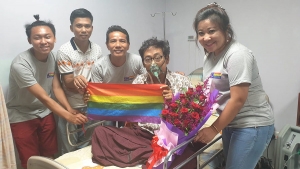
“It is rare to find such a diverse set of skills and expertise in a single person in the LGBT movement, but he is the one. I saw even those who do not support LGBT people change their minds and come to support him,” said Daw May Sabe Phyu.
Everyone who used to work or is working with him shares cherished memories of working together.
When he teaches, even new trainees learn everything easily—including the most complex topics—from legal issues to advocacy skills. He has a great aptitude for teaching and commanding people’s attention, they said.
Hla Myat Tun reiterated that as a teacher, U Aung Myo Min remains very dedicated to human rights—beliefs he’s never swayed from—and he never hesitates to instruct and share knowledge.
U Aung Myo Min says he wants his colleagues in the Myanmar LGBT Rights Network to continue working together, as the movement is becoming more accepted in Myanmar society than ever before. Reflecting on the current human rights situation in the country, he said he wants people to control their individual egos, which can otherwise lead to hate and negative forms of competition. He called for the peace and the rights of those caught between conflict zones and those facing racial discrimination.
“We just need to see humans as humans and respect them regardless of race, religion or ideological difference,” he said.
Topics: Activism, Discrimination, homophobia, LGBT, U Aung Myo Min

